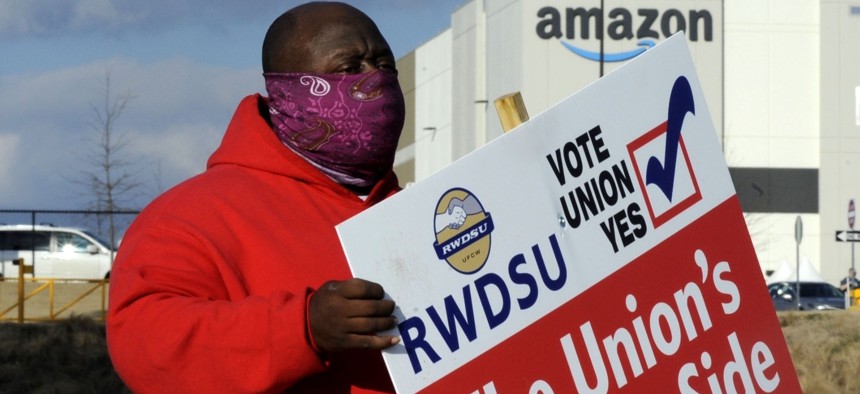Mayors Wade Into Contentious Labor Law Debate

In this Feb. 9, 2021 photo ,Michael Foster of the Retail, Wholesale and Department Store Union holds a sign outside an Amazon facility where labor is trying to organize workers in Bessemer, Ala. AP Photo/Jay Reeves, File
A U.S. Conference of Mayors panel moved to endorse a federal bill meant to strengthen workers rights, that is drawing strong pushback from business groups.
A U.S. Conference of Mayors committee on Wednesday weighed in on controversial labor legislation that is pending in Congress, throwing their support behind the union-backed bill.
Members of the conference are meeting virtually via Zoom this week after canceling their in-person gathering in Austin, Texas due to Covid-19. Ten standing committees are considering proposed resolutions, staking out the mayors’ official positions on a range of policy issues.
Wednesday afternoon, the Metro Economies Committee adopted a package of 11 resolutions—these, for example, voiced support for re-instituting a federal tax exemption for a type of debt refinancing that the 2017 federal tax overhaul did away with, and for Congress to approve a permanent expansion of the child tax credit.
But one resolution—Resolution 78—was set aside for separate consideration, with Mayor Steve Ponto of Brookfield, Wisconsin raising objections. That measure states that the Conference of Mayors “supports the Protecting the Right to Organize (PRO) Act and other federal legislation to protect public employee collective bargaining.”
The PRO Act is designed to bolster workers’ rights in a range of ways, including by tightening standards for when employers can classify employees as independent contractors. It would also override state “right-to-work” laws that prohibit people from having to pay fees to unions that are active in their workplaces, but that they do not to join.
There is a slate of other provisions in the bill that supporters say would strengthen workers' ability to organize and collectively bargain.
Labor unions and left-leaning organizations are pushing for the bill. President Biden has also voiced support for it.
Opposed are business groups, including the U.S. Chamber of Commerce and the National Retail Federation, which has dubbed the legislation the “worst bill in Congress.”
The bill passed out of the U.S. House in March on a 225-206 vote, with five Republicans joining Democrats in favor. But it faces much longer odds in the Senate, where it is unlikely to gain enough GOP support to get the 60 votes needed to overcome a filibuster.
Mayors Back the Bill
Ponto’s concerns about Resolution 78 centered not on the language voicing support for public sector bargaining, but rather the portion endorsing the PRO Act. This part of the measure, he said, delved too far into private sector labor issues and meant taking a position that is at odds with right-to-work laws, which are on the books in 27 states.
“The issue is that it affects private employment relationships,” Ponto said. He offered an amendment to the resolution that, as he described it, would have made clear that the measure applied only to public employees and not to the private sector. But this proposal failed.
Tucson, Arizona Mayor Regina Romero co-sponsored the resolution with Nan Whaley, mayor of Dayton, Ohio who is running for governor in the state. Even though Whaley does not have a vote on the Metro Economies Committee, she dropped in on Wednesday's meeting to register support for the resolution, saying it was important to her.
Whaley and Romero both flagged growing income inequality over the past 50 years as a problem that stronger labor laws could help to address. “Research shows that this decline in union membership is a direct cause of the rise in economic inequality,” Whaley said.
Romero said she grew up in a farming community and saw “first hand what the power of organizing and labor did for the quality of life and pay of my parents and our families.” She said the resolution was intended to support the PRO Act, “and the right to collectively bargain for all workers,” and that Ponto’s amendment would have fundamentally altered it.
Apart from Ponto’s pushback, the resolution passed unopposed. Mayor Luke Bronin, of Hartford, Connecticut, who chairs the committee and Mayor Tim Keller, of Albuquerque, New Mexico, who is vice chair, were among the other supporters.
Bronin said if the resolution were narrowed to just public workers it would “fail to have the desired effect.” He said he would present the resolution, along with the others the committee adopted, to the conference's Executive Committee on Aug. 31 for final approval.
Bill Lucia is a senior editor for Route Fifty and is based in Olympia, Washington.
NEXT STORY: New York City Council Aides are Officially Unionized, After 21-month Campaign






